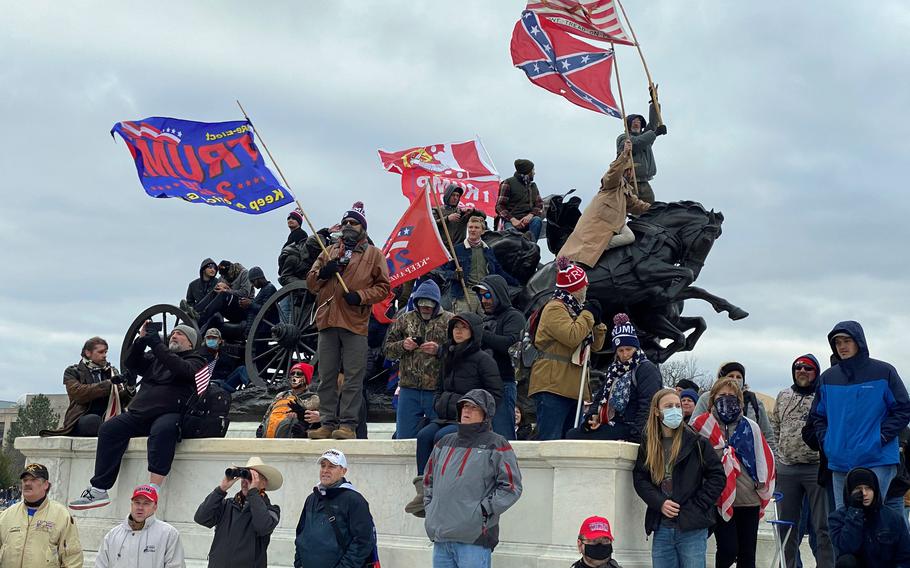
A man waving a Confederate flag and others watch rioters storm the Capitol in Washington, D.C., on Jan. 6, 2021. More than 100 of the 700 people accused so far of taking part in the assault on the Capitol served in the military, according to a national consortium for the study of terrorism. (Robert H. Reid/Stars and Stripes)
The number of people with military backgrounds identified in a database of domestic extremists has quadrupled in the past decade, a University of Maryland study found.
From 1990 through November 2021, at least 458 people affiliated with the military committed criminal acts that were motivated by political, economic, social, or religious goals, according to the study “Extremism in the Ranks and After.”
The report, which came out in December, preceded the news last week that the Defense Department Inspector General will review the military’s performance in vetting recruits for extremism.
Until 2010, an average of just less than seven current or former service members were added each year to a database the researchers used, the Profiles of Individual Radicalization in the United States, or PIRUS.
Since 2010, though, the average has ballooned to 28.5 such additions a year.
To be included in PIRUS, a subject must have been radicalized in the United States; adhered to or espoused views that justify the use of illegal means to achieve their goals; and committed a criminal offense that was clearly motivated by their ideological views, the report stated.
The attack on the U.S. Capitol on Jan. 6, 2021, is significantly reflected in the spike.
But even without figuring in the numbers from the Capitol riot, an average of 17.7 people a year with military backgrounds have been added to the PIRUS database since 2010, the study said.
"It is important to note that the recent increase in subjects with military backgrounds in PIRUS is largely due to three years in the data — 2017, 2020, and 2021," according to the study. "Each of these years were marked by issues that mobilized comparatively large numbers of U.S. extremists."
Those mass mobilizations included the Unite the Right rally in Charlottesville, Va., in 2017; demonstrations stemming from the COVID-19 pandemic; racial justice protests; activities based on the 2020 presidential election; and the Capitol breach.
Since 1990, about 60% of the offenders in PIRUS with military backgrounds plotted acts of violence, according to the study. However, just 35.1% of them successfully carried out those plans.
Another 3.8% engaged in spontaneous violent crimes, such as starting fights at protests.
Nearly half of the crimes committed targeted U.S. government entities, the U.S. military or law enforcement, the study found. More than 30% espoused views of white supremacy, white nationalism, xenophobia or a combination of the three.
"These individuals were affiliated with no fewer than 50 extremist groups, including local skinhead gangs and several national white supremacist organizations," according to the study.
Rachel VanLandingham, a law professor at Southwestern Law School in Los Angeles and a former Air Force prosecutor, suggested on the military law website CAAFLOG that aspects of military culture may make some service members more susceptible to extremist group messaging.
"While military service teaches generic fidelity to the Constitution, our armed forces’ training, laws, customs, and operations emphasize to a far, far greater extent the notion of obedience to orders — of fidelity to command," she wrote.
"Buttressing the dynamic of fidelity to command is the unifying and highly motivating concept of patriotism, of pride in country — and the sense of belonging and working toward something greater than oneself."
Many veterans strive to recapture those feelings after they’ve left the ranks, she wrote, and can be misled by groups like the Oath Keepers.
Oath Keepers espouses a core belief that the oath they took to defend the Constitution lasts forever. The group focuses on recruiting former and current military, law enforcement and first-responder personnel, a Justice Department statement said Thursday.
Eleven members of the group were charged last week with seditious conspiracy in connection with the 2021 Capitol attack, including its founder, Stewart Rhodes.
Members of the group moved toward the Capitol in stack formations, while Oath Keeper quick reaction force teams “were prepared to rapidly transport firearms and other weapons into Washington, D.C., in support of operations aimed at using force to stop the lawful transfer of presidential power,” the Justice Department statement said.
Of the 458 total people in the PIRUS database who have a military background, 118 were involved in the Capitol attack. Almost 84% were no longer serving, and all but nine are men, the study found.